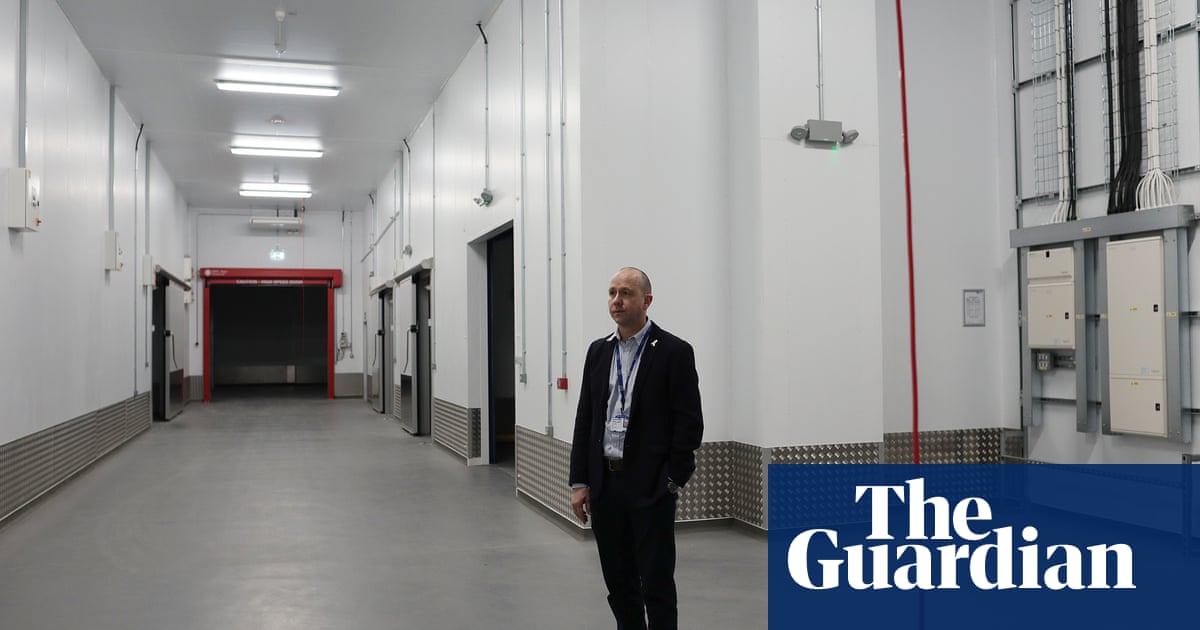A £25m post-Brexit border control post in Portsmouth may have to be demolished if theUK government’s deal with the EUremoves the need for health and veterinary checks on food imports, according to the port’s director.
Mike Sellers had already spoken out last yearabout how more than half of the site would never be usedbecause planned checks on EU food and plant products had been pared back since it was designed, leading to the building being called a “white elephant”.
The hi-tech facility at the UK’s second busiest cross-Channel terminal was one of more than 100 border control posts (BCPs) around the countrybuilt to government specificationsto handle post-Brexit checks on imports subject to sanitary and phytosanitary checks, such as meat, fish, dairy products, fruit and vegetables.
Under Keir Starmer’s deal with the EU announced on Monday, someroutine checks on animal and plant products would be scrapped completely.
“Anything that would smooth the movement of trade as well as passengers around the port is welcomed, although the devil is in the detail,” said Sellers. “Based on Monday’s announcement and the information that has been provided, we believe that then negates the need for the border control post,” he added, leaving it with two costly choices.
Sellers said the port’s owner,Portsmouthcity council, could either “repurpose the facility and see whether we can get another use out of it, or demolish it to give us some more operational land”.
Boasting 14 lorry bays, Portsmouth’s 8,000 sq metre (86,000 sq ft) border site was designed to allow inspection of low- and high-risk goods in air-lock quarantine zones to prevent cross-contamination.
However, it has been heavily underused since it began operating in April last year, after the previous Conservative government’s changes to its post-Brexit import regime, known as the border target operating model, whichsignificantly reduced the number of tests required.
An average of three checks have been carried out each day at Portsmouth’s BCP in the 12 months since it began operating, Sellers said, compared with the 80 a day for which it was built.
It and other ports have also been unable to earn the expected amount of money from levying charges on importers for the goods checks.
Portsmouth, along with 40 other ports, received £200m in government funding for the new control posts. However, theport infrastructure fundwas oversubscribed, meaning the ports themselves had to spend an estimated £120m to cover the remaining building costs.
Sellers’ port received £17.1m from the fund after applying for £32m, forcing the council to take out a loan to cover the shortfall.
Sign up toBusiness Today
Get set for the working day – we'll point you to all the business news and analysis you need every morning
after newsletter promotion
The British Ports Association (BPA) has welcomed the new deal between the UK and the EU, but isreiterating its call for compensationfor ports that were forced to build now-redundant border infrastructure.
“The sector is out of pocket by £120m in infrastructure costs and ongoing costs,” said Richard Ballantyne, the industry body’s chief executive.
“It is very expensive to repurpose and modify the border facilities, and in some cases it will be more cost-effective to demolish them. We are left in a precarious situation of not knowing what to do, but ultimately the cost will need to be passed on as port operations can’t continue taking a hit.”
The BPA estimates that the running costs for a larger BCP, such as Portsmouth, with about 15 lorry bays will be £200,000 a year, to cover energy, cleaning, insurance and business rates. Smaller BCPs may have running costs of about £100,000 a year.
Portsmouth is backing the BPA’s call for compensation, and said the local authority had been left about £6m out of pocket.
“We have been left with this huge white elephant,” said Sellers. “We are not blessed with a lot of operational land, and this took up acres of land and the opportunity cost around that. We were unable to handle some of the potential new business that could have come through Portsmouth.”
